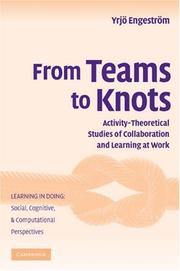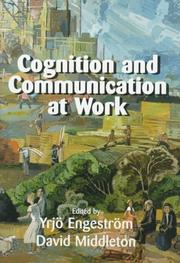| Listing 1 - 7 of 7 |
Sort by
|
Multi
ISBN: 9519593322 Year: 1987 Publisher: Helsinki : Orienta-Konsultit Oy,
Abstract | Keywords | Export | Availability | Bookmark
 Loading...
Loading...Choose an application
- Reference Manager
- EndNote
- RefWorks (Direct export to RefWorks)
159.953.5 --- 37.001 --- Active learning --- Action learning --- Activity learning --- Activity teaching --- Learning --- Experiential learning --- Leren. Verwerven van kennis --- Filosofie van opvoeding en onderwijs --- Theses --- Active learning. --- 37.001 Filosofie van opvoeding en onderwijs --- 159.953.5 Leren. Verwerven van kennis

ISBN: 0521865670 0521148499 9786611383305 0511397496 0511396724 051139599X 0511619847 1281383309 0511399073 0511398239 1107178789 9780511396724 9780511399077 9780511397493 9780511619847 9780521865678 9780521148498 9781107178786 9781281383303 6611383301 9780511398230 Year: 2008 Publisher: Cambridge New York Cambridge University Press
Abstract | Keywords | Export | Availability | Bookmark
 Loading...
Loading...Choose an application
- Reference Manager
- EndNote
- RefWorks (Direct export to RefWorks)
Teams are commonly celebrated as efficient and humane ways of organizing work and learning. By means of a series of in-depth case studies of teams in the United States and Finland over a time span of more than 10 years, this book shows that teams are not a universal and ahistorical form of collaboration. Teams are best understood in their specific activity contexts and embedded in historical development of work. Today, static teams are increasingly replaced by forms of fluid knotworking around runaway objects that require and generate new forms of expansive learning and distributed agency. This book develops a set of conceptual tools for analysis and design of transformations in collaborative work and learning.
Health Sciences --- Psychiatry & Psychology --- Teams in the workplace. --- Organizational learning. --- Learning organizations --- Learning --- Communities of practice --- Knowledge management --- Groups, Work --- Team building in the workplace --- Team work in the workplace --- Teambuilding in the workplace --- Teams, Work --- Teamwork in the workplace --- Work groups --- Work teams --- Social groups --- Work environment --- Organizational learning --- Teams in the workplace --- 658.386.012 --- 658.387.4 --- Opleidingsmethoden --- Groepsarbeid
Book
ISBN: 1316792145 1316792625 1316793109 1316793583 1316795020 1316225364 110710520X 1107512441 1316789268 9781316793589 9781316225363 9781316795026 9781107105201 9781107512443 9781107512443 Year: 2016 Publisher: New York, NY
Abstract | Keywords | Export | Availability | Bookmark
 Loading...
Loading...Choose an application
- Reference Manager
- EndNote
- RefWorks (Direct export to RefWorks)
Professor Engeström's exciting approach sees expansive learning as the central mechanism of transformation in societal practices and institutions. For researchers and practitioners in education, this book provides a conceptual and practical toolkit for creating and analyzing expansive learning processes with the help of interventions in workplaces, schools and communities. Chapters 1-3 situate the theory of expansive learning in the field of learning science. Chapters 4-8 contain empirical studies of expansive learning in various organizational settings (such as banks, schools and hospitals). In Chapters 9-10, the author looks at new challenges and possibilities arising from rapidly spreading 'wildfire' activities (disaster relief, for example) and from the methodology of formative interventions aimed at triggering and supporting expansive learning. This book provides an integrative account of recent empirical studies and conceptual developments in the theory of expansive learning, and serves as a companion volume to Learning by Expanding.
Active learning. --- Learning, Psychology of. --- Learning --- Psychology of learning --- Educational psychology --- Comprehension --- Learning ability --- Action learning --- Activity learning --- Activity teaching --- Experiential learning --- Psychological aspects --- Expansive learning

ISBN: 0521441048 0521645662 113917407X 9780521645669 9781139174077 9780521441049 Year: 1996 Publisher: Cambridge : Cambridge University Press,
Abstract | Keywords | Export | Availability | Bookmark
 Loading...
Loading...Choose an application
- Reference Manager
- EndNote
- RefWorks (Direct export to RefWorks)
This book brings together contributions from researchers within various social science disciplines who seek to redefine the methods and topics that constitute the study of work. They investigate work activity in ways that do not reduce it to a 'psychology' of individual cognition nor to a 'sociology' of societal structures and communication. A key theme in the material is the relationship between theory and practice. This is not an abstract problem of interest merely to social scientists. Rather, it is discussed as an issue that working people address when they attempt to understand a task and communicate its demands. Mindful practices and communicative interaction are examined as situated issues at work in the reproduction of communities of practice in a variety of settings including: courts of law, computer software design, the piloting of airliners, the coordination of air traffic control, and traffic management in underground railway systems.
Primary groups --- Sociological theories --- Mass communications --- Health Sciences --- Psychiatry & Psychology --- Communication in organizations. --- Interpersonal communication. --- Symbolic interactionism. --- Interaction, Symbolic --- Interactionism, Symbolic --- Symbolic interaction --- Symbolic-interactionist theory --- Qualitative research --- Social psychology --- Communication --- Interpersonal relations --- Organizational communication --- Organization --- Methodology
Book
ISBN: 1281079162 9786611079161 1846635772 Year: 2007 Publisher: Bradford, England : Emerald Group Publishing,
Abstract | Keywords | Export | Availability | Bookmark
 Loading...
Loading...Choose an application
- Reference Manager
- EndNote
- RefWorks (Direct export to RefWorks)
Workplace learning and organizational learning as areas of inquiry stem from different and still quite separate disciplinary backgrounds and commitments. Workplace learning has largely emerged as an extension of educational research stepping beyond the confines of schools and other institutions of formal learning. The commitment of studies of workplace learning is commonly pedagogical: improvement of conditions and practices of learning and instruction in work settings. Organizational learning emerged as a sub-field of organization and management studies, trying to find explanatory mechanisms

ISBN: 008044296X Year: 2003 Publisher: Amsterdam Pergamon
Abstract | Keywords | Export | Availability | Bookmark
 Loading...
Loading...Choose an application
- Reference Manager
- EndNote
- RefWorks (Direct export to RefWorks)
Adult education. Lifelong learning --- 371.01 --- Onderwijskunde:theorie --(algemeen) --- 371.01 Onderwijskunde:theorie --(algemeen) --- Adult learning --- School-to-work transition --- Transfer of training --- Transfer of learning --- Educational psychology --- Learning, Psychology of --- Formal discipline --- School-to-careers programs --- School-to-work programs --- Transition, School-to-work --- Career education --- Education, Cooperative --- Andragogical learning --- Learning
Book
Year: 1996 Publisher: New York (N.Y.) : Cambridge university press,
Abstract | Keywords | Export | Availability | Bookmark
 Loading...
Loading...Choose an application
- Reference Manager
- EndNote
- RefWorks (Direct export to RefWorks)
| Listing 1 - 7 of 7 |
Sort by
|

 Search
Search Feedback
Feedback About UniCat
About UniCat  Help
Help News
News